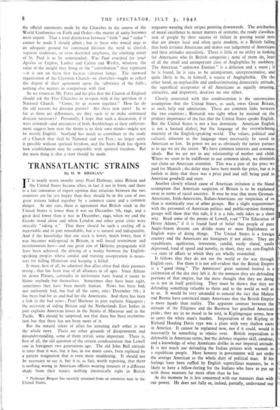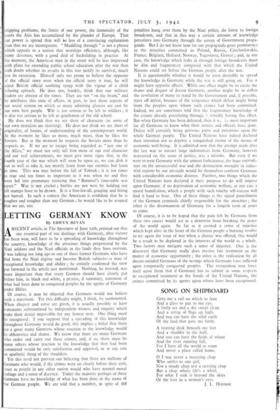TRANSATLANTIC STRAINS
By D. W BROGAN*
IT is nearly seven months since Pearl Harbour, since Britain and the United States became allies, in fact if not in form, and there is a fair consensus of expert opinion that relations between the two countries are far less happy than they should be in the case of two great nations linked together by a common cause and a common danger. At any rate, there is agreement that British stock in the United States is lower than it was on December 7th, 1941, and a great deal lower than it was in December, 1940, when we and the Greeks stood alone and when London and other great cities were stoically "taking it." That there should be such a cooling off is regrettable and in part remediable, but it is natural and indisputable. And if the knowledge that our stock is lower, much lower, than it was becomes widespread in Britain, it will breed resentment and recrimination here—and one great aim of Llitlerite propaganda will have been achieved, the driving of a wedge between the English- speaking peoples whose cordial and trusting co-operation is neces- sary for killing Hitlerism and keeping it killed.
It must, first of all, be admitted that allies often find their partners. trying ; that has been true of all alliances in all ages. Since Athens let down Plataea,- comrades in misfortune have found it easier to blame anybody but themselves. Sometimes they have been right, sometimes they have been merely human. News has been bad, not uniformly bad, but bad all the same, since December 7th ; it has been bad for us and bad for the Americans. And there has been a link in the bad news ; Pearl Harbour in part explains Singapore ; the necessity of aiding Britain and the Netherlands East Indies in part explains American losses in the Straits of Macassar and in the Pacific. We should be surprised, not that there has been recrimina- tion but that there has not been more of it.
But the natural talent of allies for irritating each other is not the whole story. There are other grounds of disagreement and misunderstanding, some of them trivial, some important. There is, first of all, the old question of the certain condescension that Lowell saw in foreigners two generations ago. The old John Bull attitude is rarer than it was, but it has, in too many cases, been replaced by a patient resignation that is even more maddening. It should not be necessary to say it, but it is, in fact, worth repeating, that there is nothing wrong in American officers wearing trousers of a different shade from their tunics, nothing intrinsically right in British -- — * Professor Brogan has recently returned from an extensive tour in the United States. sergeants wearing their stripes pointing downwards. The attribution of moral excellence to minor matters of costume, the ready classifica- tion of people by their success or failure in passing social tests that are always local and often quite modern, is a British failing that both irritates Americans and makes our judgement of Americans and their attitudes unrealistic. There is little or no utility in looking for Americans who fit British categories ; none of them do, least of all the small and unimportant class of Anglophiles by snobbery. The American "unknown Etonian" is a delusion and a snare ; if he is found, he is sure to be unimportant, unrepresentative, and quite likely to be, in himself, a source of Anglophobia. On the other hand, an unplausible and undiscriminating democratic attitude, the superficial acceptance of all Americans as equally amusing, attractive, and important, deceives no one either.
Closely associated with this condescension is the unconscious assumption that the United States, as such, owes Great Britain, as such, help and admiration. There are common links between the two countries ; Bismarck was right when he insisted on the primary importance of the fact that the United States speaks English. But the United States is not a lost dominion. American English is not a bastard dialect, but the language of the overwhelming majority of the English-speaking world. The values, political and cultural, inherent in the language must necessarily be saved in American or lost. In power we are as obviously the junior partner as in age we are the senior. We have common interests and common ideals. But we are not in any relationship of mother and child. Where we seem to be indifferent to our common ideals, we diminish our claim on American attention. This was a part of the price we paid for Munich ; the delay may have been worth the price, but it is foolish to deny that there was a price paid and still being paid in American goodwill and trust.
Another closely related cause of American irritation is the bland assumption that American suspicion of Britain is to be explained away in terms of racial ancestry. It may be true that more German- Americans, Irish-Americans, Italian-Americans are suspicious of us than is statistically true of other groups. But a slight acquaintance with the personnel of American politics and public-opinion forming groups will show that this rule, if it is a rule, only takes us a short way. Read some of the poems of Lowell, read "The Education of Henry Adams," if it is found hard of belief that people of pure Anglo-Saxon descent can dislike many or most Englishmen or English ways of doing things. The United States is a foreign country and the Americans are foreigners if not aliens. They are republicans, egalitarian, irreverent, candid, easily elated, easily depressed, fond of speed and novelty, in short, they are non-English —a state of affairs to which they are wholly reconciled.
It follows that they do not see the world or the war through English eyes. For them it is not self-evident that the British Empire is a "good thing." The Americans' great national festival is a celebration of the day they left it. At the moment they are defending portions of that empire, but the mere thought that they are doing so is not in itself gratifying. • They must be shown that they are defending something valuable to them and to the world as well as to us. It would be very uncandid to conceal the fact that Malaya and Burma have convinced many Americans that the British Empire is more façade than reality. The apparent contrast between the attitude of the Filipinos and the Burmese has gratified American pride ; they are•in no mood to be told, in Kiplingesque terms, how to carry the white man's burden. Imperialism of the Kipling or Richard Harding Davis type was a plant with very shallow roots in America. It cannot be replanted now, nor if it could, would it necessarily be something to rejoice over. British imperialism is defensible in American terms, but-the defence requires skill, candour, and a knowledge of what Americans dislike in our imperial attitude. It is not much use defending the Indian princes with warmth to a republican people. Mere honesty in government will not strike the average American as the whole duty of political man. If his feelings have been ruffled by English supercilious manners, he is likely to have a fellow-feeling for the Indians who have to put up with those manners far more often than he has.
At the moment he is less concerned with our manners than with our power. He does not fully or, indeed, partially, understand our shipping problems, the limits of our power, the immensity of the assets the Axis has accumulated by the plunder of Europe. That
our power is spread thin will :se less of a convincing explanation than that we are incompetent. "Muddling through" is not a phrase which appeals to a nation that worships efficiency, although, like many devotees, with a good deal of backsliding in practice. At the moment, the American man in the street will be less impressed with plans for extending public school education after the war than with doubt whether its results in this war justify its survival, much less its extension. Himself only too prone to believe the opposite of the official story even when the official story is true, he will reject British official soothing syrup with the vigour of a child refusing spinach. He does not, frankly, think that our military leaders are abreast of the times. They are not "on the beam," and he attributes this state of affairs, in part, to just those aspects of our social system on which so many admiring glances are cast by our own best people. \KM is too serious to be left to soldiers ; it is also too serious to be left to gentlemen of the old school.
He does not think that we are short of character (as some of our own moralists are insisting). He does not think we are short of originality, of brains, of understanding of the contemporary world. At the moment he likes us more, much more, than he likes the Soviets. But at the moment he respects the Soviets more than he espects us. If we are to escape being regarded as "just one of he Allies," we must not only tell him more of our real character nd our real achievements, we must give more signs that, in the ourth year of the war which will soon be upon us, we can dish it ut as well as take it, not merely learn from our enemies but learn
n time. This was true before the fall of Tobruk ; it is ten times s true and ten times as important as it was when we and they ere led into premature rejoicing that " Rommel's time-table was pset." War is not cricket ; battles are not won by holding out ill stumps have to be drawn. It is a free-for-all, gouging and biting ot barred. In such a contest the American is confident that he is ougher and rougher than any German ; he would like to be assured hat we are, too.



























 Previous page
Previous page